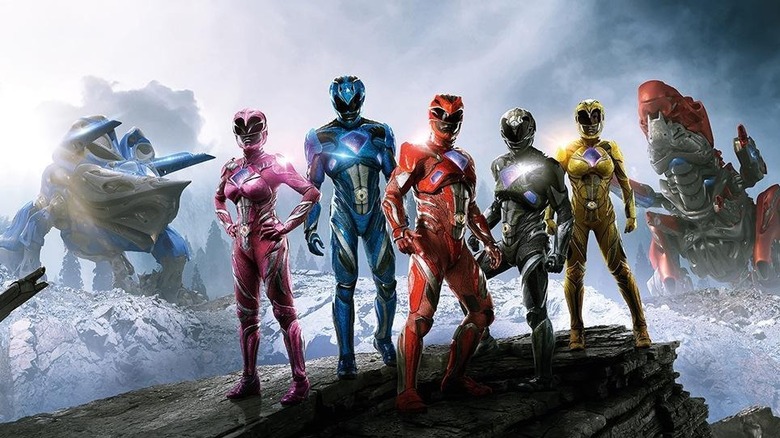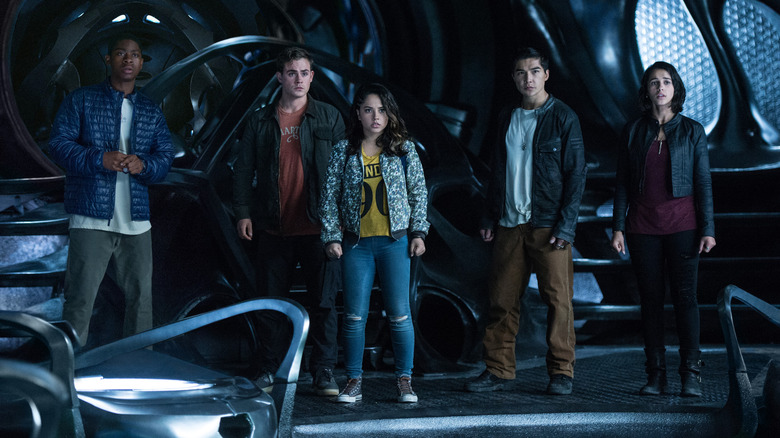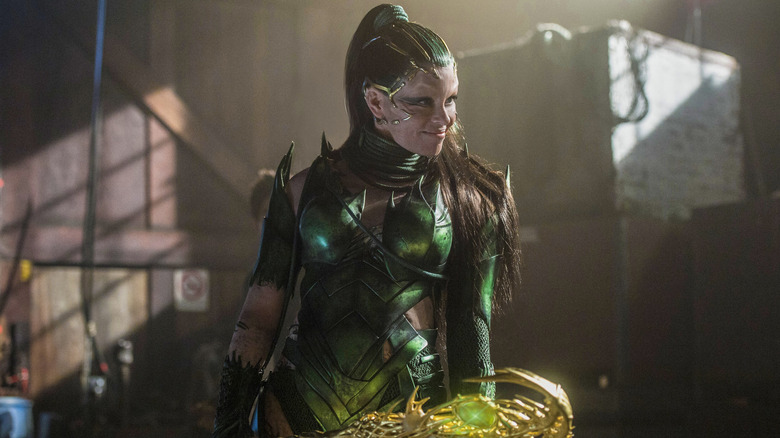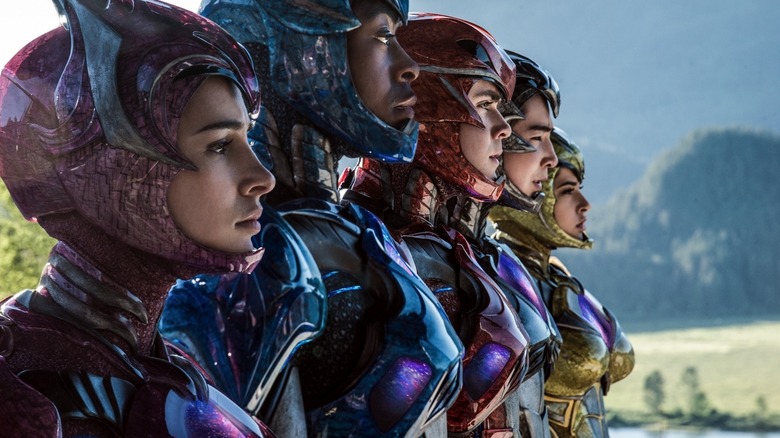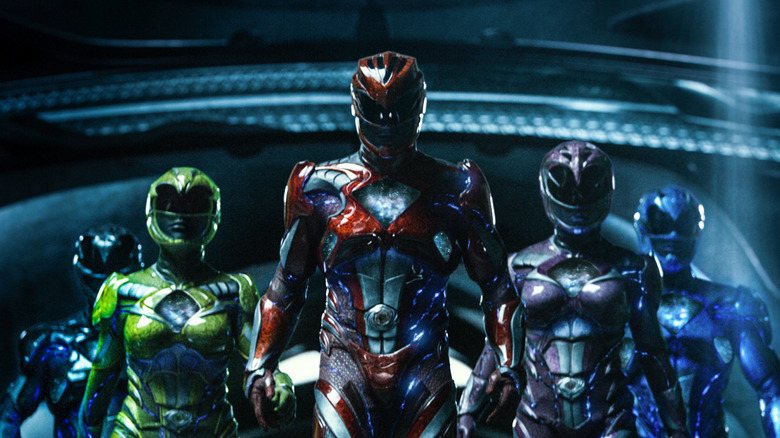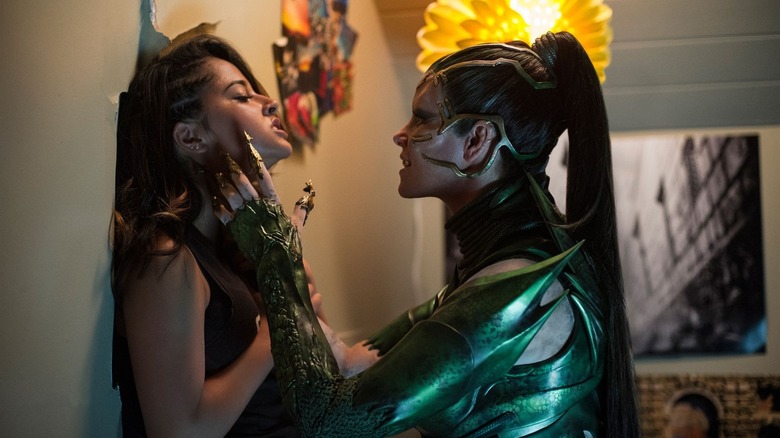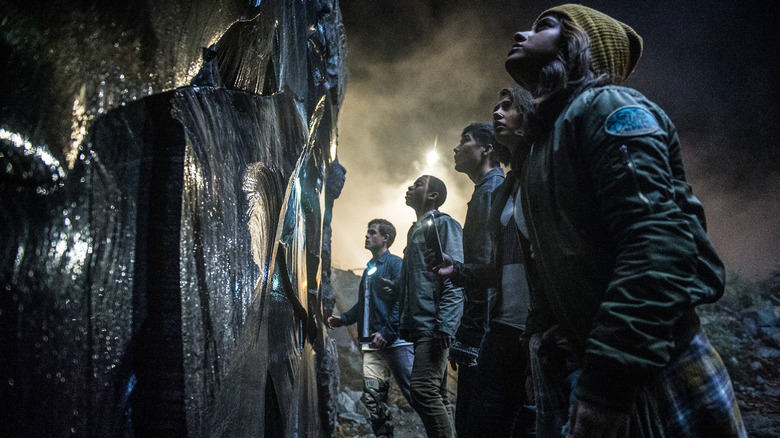Tales From The Box Office: 2017's Power Rangers Overestimated The Franchise's Blockbuster Potential
(Welcome to Tales from the Box Office, our column that examines box office miracles, disasters, and everything in between, as well as what we can learn from them.)
"Mighty Morphin Power Rangers" first hit the airwaves in 1993, and even though that original iteration of Rangers didn't last all that long, the series has remained remarkably enduring. 30 years later, the series has aired nearly 1,000 episodes through its various iterations, has inspired hundreds of issues of comics books, millions in toy sales, and is truly a globally recognized brand with huge staying power. Still, the franchise has never managed to fully crack the code in making the jump to movies.
Two films, the "Mighty Morphin Power Rangers" movie in 1995 and "Turbo: A Power Rangers Movie," did fine enough by '90s "kids movies based on a show" standards, which were ultimately more about selling toys and copies of the films on VHS. But in 2017, Lionsgate decided to team up with Saban to turn these teenage superheroes into a blockbuster franchise — and it failed spectacularly.
In honor of the "Mighty Morphin Power Rangers: Once and Always" 30th anniversary special's arrival on Netflix (read our review here), we're looking back at 2017's "Power Rangers," how unbelievably confident everyone seemed in what they had, what happened when it finally hit theaters, and what lessons we can learn from it several years removed. Let's dig in, shall we?
The movie: Power Rangers
In 2014, Saban and Lionsgate announced plans for a live-action "Power Rangers" film, which was very much intended to be the start of a franchise. In the initial announcement, Haim Saban said, "Lionsgate is the perfect home for elevating our Power Rangers brand to the next level," citing hits like "The Hunger Games" and "Twilight" as examples of the studio doing this sort of thing successfully. Indeed, that's true, as those were both monster franchises. But both of those series had somewhat more humble beginnings before ballooning to full blockbuster status after a proven hit. "Power Rangers" would be different, as it would be a $100 million behemoth right from the get-go.
Originally, writers Ashley Miller and Zack Stentz ("X-Men: First Class") were tapped to pen a screenplay, but it went through several hands with John Gatnis ("Real Steel") receiving credit, while Matt Sazama and Burk Sharpless ("Gods of Egypt"), as well as Michele Mulroney and Kieran Mulroney ("Sherlock Holmes: A Game of Shadows") received "story by" credits. Dean Israelite, coming off of "Project Almanac," landed the coveted gig as the film's director in 2015. Speaking to IGN around the time he was hired, Israelite explained what drew him to the film:
"I read the script and was really surprised by it and thought there was a really cool, contemporary, mature but still playful, buoyant and fun take on the material, and was updated in a really interesting way. It had this wonderful character that's essential to going on a fantastic adventure. I was instantly drawn to it. I remember it as a kid. I grew up with it in South Africa. When I opened the script I had no idea how it was going to be updated, and I was really impressed by it. So I put a really big presentation together, because I needed to win the job."
No shortage of talent
Between Israelite and the small army of writers, a story was cooked up that was sort of an expansion of the debut episode of "Mighty Morphin Power Rangers," albeit with plenty of modern flare. The movie we end up with follows five otherwise ordinary high school kids who discover that their small town of Angel Grove is about to be obliterated by an alien threat. Destiny wills it that they are the only ones who can save the planet, so they must overcome their real-life issues, embrace their newfound powers, and work together.
The core cast of Rangers was led mostly by then-up-and-comers such as Darce Montgomery (now very famous thanks to "Stranger Things"), Naomi Scott (now also very famous thanks to the $1 billion-grossing remake of "Aladdin"), RJ Cyler, Ludi Lin, and Becky G. But Lionsgate did rope in some A-listers, including Elizabeth Banks, coming off of her run in "The Hunger Games" films, as the villainous Rita Repulsa. Most interestingly, "Breaking Bad" star Bryan Cranston was cast as Zordon, mentor to the Power Rangers. This was a bit of full-circle casting, as Cranston actually provided some voices to characters in the original series before he broke out as a big star. Speaking to Entertainment Weekly ahead of the release, Cranston had this to say about it:
"The tenant of that storyline is that this a real person who is trapped in this etherworld and it becomes this in-the-wall so to speak of [the command center]. He still has a heart and mind, but an agenda that he's got to get these five Power Rangers to defend the Earth or else everyone they know will be killed."
Giving the Rangers a blockbuster update
While many of the characters and iconography in the film were familiar to fans of the show, it was absolutely updated to suit the look of a modern Hollywood blockbuster. Gone were the inexpensive graphics that brought the robotic Zords to life. Also gone were the cloth suits that were very much on a "made for TV" budget previously. Speaking to EW ahead of the release, Israelite explained that they were trying to make the costumes stand out in the superhero movie landscape:
"We've really pushed ourselves to make them feel different from any other superhero costume that's out there. One key that's different to the Power Ranger suits is that they're not really suits that people get into. They're suits that morph onto our kids, so they already have this almost metaphysical quality to them."
Production designer Andrew Menzies also spoke with EW about the suits and he had no illusions, understanding that the new look might alienate some fans. "It's tricky finding a new language for a superhero costume. Ours is an alien costume that grows on them, that's not man-made. You can't win everyone over, but we are trying to appeal to a more mature audience and gain new fans," he explained. Meanwhile, Israelite also felt it was extremely important to have a diverse cast portraying the Rangers in the film:
"From the very beginning, diversity was a very important part of the whole process. We switched all of the races around, but we made sure that the essence of each of those characters are who they were in the original show, and this really will be an origin story of those characters."
The financial journey
Lionsgate got pretty clever with the marketing and even cooked up a fake in-universe Angel Grove newspaper to help promote the film. They also had some pretty big product tie-ins, including one with Krispy Kreme. It had all of the makings of a big summer blockbuster. Unfortunately, heading into opening weekend, the response was a bit mixed. For reference, the film currently holds a 51% critical rating on Rotten Tomatoes, paired with a so-so 65% audience score. Not exactly a great omen for a movie with a $100 million budget intended to kick off a big franchise.
"Power Rangers" hit theaters on March 24, 2017, getting in on the spring break frame that has been kind to some big films over the years, such as "300" and "Ice Age: The Meltdown." However, it didn't pan out in this case. The film debuted at number two on the domestic charts with a decent-but-not-great $40.3 million start. Unfortunately, Disney's "Beauty and the Beast" remake was in its second weekend smack in the middle of a $1.2 billion global run. "Kong: Skull Island" was also in its third weekend, finishing at number three. Plus, Sony released the sci-fi flick "Life" that same weekend, and "Logan" was still hanging around the top five. Competition was fierce.
The movie fell off a cliff in its second weekend, dropping 64.8% for a $14.2 million haul as "The Boss Baby" and "Ghost in the Shell" gave audiences even more to choose from. The writing was on the wall. The big screen reboot wrapped up its run with a crushing $85.3 million domestic and disastrous $56.9 million internationally for a grand total of $142.3 million. As a result, it's estimated that the film lost around $75 million. In other words, it was an absolute trainwreck.
The financial aftermath
In most cases, a finish like that would spell instant doom, but the aftermath for "Power Rangers" was unique, to say the least. It must be emphasized that Saban and Lionsgate were very high on this as a long-running concern, with a six-movie plan in the cards ahead of the first movie's release. "The Saban team, even before I came on to this project, had a document that laid out six movies," Israelite said to EW as the movie was hitting theaters. Needless to say, those sequels never came to pass.
Dean Israelite tried to do some damage control in June while promoting the Blu-ray release, saying that the film's PG-13 rating ultimately hurt them. "If the movie had been rated PG, there would have been more traffic. I think parents were unsure if they could bring their kids to the movie, which surprised me, because the movie is a tame PG-13," the director said to ScreenRant.
There was a bit of a groundswell effort to at least make it look like a sequel was still going to happen, perhaps to at least make it appear as though the movie was successful. First, reports surfaced of surging "Power Rangers" toy sales around the release of the film, with April 2017's sales up 185% year-over-year in the aftermath of the movie's release. The movie also topped the home video charts in its first week of release, though that doesn't mean as much as it once did, given the rise of streaming and VOD greatly cutting into physical media sales. Plus, Israelite said sequel discussions were taking place. Again, speaking to ScreenRant in June 2017:
"I hope [to make a sequel]. It's obviously not up to me, but I know the studio (Lionsgate) and Saban are talking in earnest about it, and are trying to push forward. They're having a discussion."
The lessons contained within
Regardless of what conversation surrounding a sequel persisted in the months that followed, it all ended when Hasbro purchased the "Power Rangers" brand for a whopping $522 million in May 2018. Now, the plan is to reboot the franchise at Netflix with a full cinematic universe in the works, headed up by Jonathan Entwistle ("The End of the F***ing World"). And, quite frankly, the streaming world seems to be a better fit for these heroes, as they won't have to shoulder the weight of delivering huge ticket sales around the world, in addition to defeating the likes of Rita Repulsa and her underlings.
Lionsgate and Saban had to learn a very, very expensive lesson here. Yes, the "Power Rangers" TV show has been popular for a long time, and yes, it's recognized the world over. But just because something has a lot of recognition doesn't automatically mean it will lend itself to a very expensive movie adaptation. Also, it's tough to get people to pay for a movie based on something they can watch for free on TV a lot of the time. A "Power Rangers" movie of some kind? Certainly. $143 million worth of box office is nothing to sneeze at. But it would have perhaps been better as a mid-budget play (which, ironically, Lionsgate is exceptionally good at).
As studios and streaming services continue to look at video games, comic books, toys, and anything else that can potentially start a movie franchise, it's worth looking at this overzealous play as a cautionary tale. Make your movie. Take your chance. Just don't do it for $100 million or more unnecessarily and doom the endeavor right from the jump when the project at hand doesn't totally call for it.
